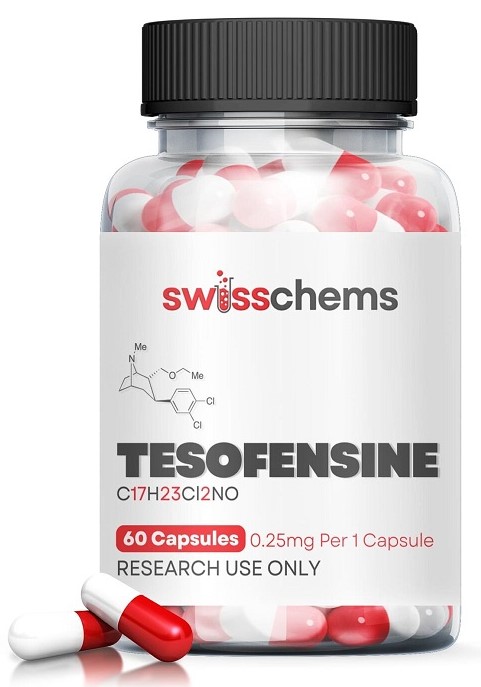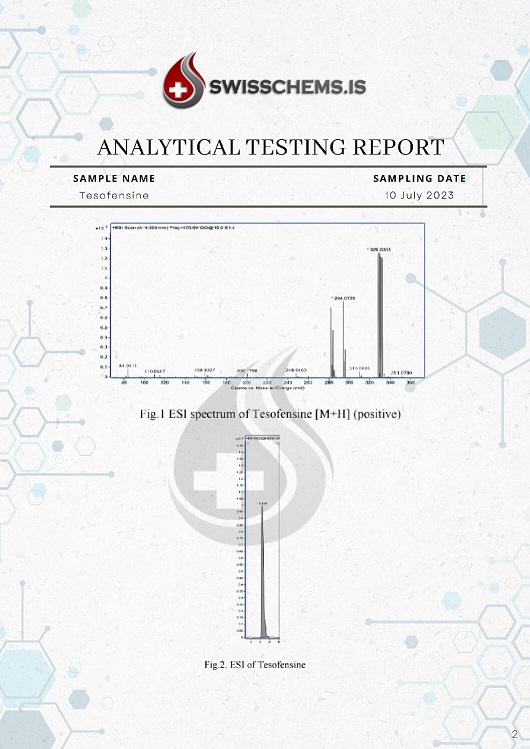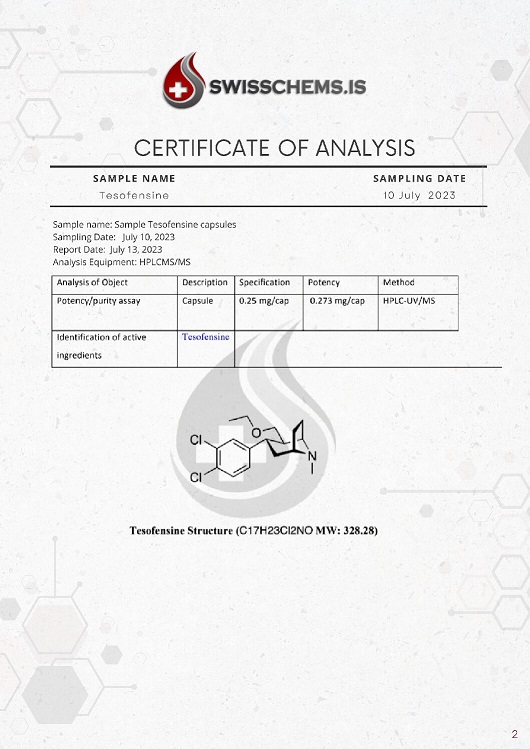Swiss Chems Tesofensine: Leaner You Ahead Today
Swisschems Tesofensine, originally developed as an antidepressant, is now emerging as a groundbreaking solution to combat the ever-growing global health crisis of obesity. With more than 650 million adults worldwide classified as obese, the urgency for effective weight loss solutions has never been greater.
In this in-depth blog post, we embark on a journey to explore the background, scientific potential, and promising outlook for this exciting new pharmaceutical candidate. Join us as we delve into the world of Swiss Chems Tesofensine and its potential to reshape the future of weight loss.
Swiss Chems Tesofensine Table Of Content
What is Swiss Chems Tesofensine?
Swiss Chems Tesofensine acts as a reuptake inhibitor, augmenting the presence of serotonin, noradrenaline, and dopamine within the brain. Its mode of operation involves the inhibition of neurotransmitters linked to hunger and appetite regulation.
The extensive research surrounding Tesofensine explores its potential in addressing neurological conditions like Parkinson’s disease and Attention Deficit Hyperactivity Disorder (ADHD).
In animal trials, Tesofensine exhibited notable improvements in both motor and cognitive functions within the respective disease models. Intriguingly, this progress came with an unexpected side effect: the subjects began to shed excessive weight.
This unforeseen outcome has prompted researchers to investigate Swiss Chems Tesofensine’s potential as a treatment for obesity. Several clinical trials have provided compelling evidence of its promise in combating obesity.
Disclaimer: Swiss Chems Tesofensine is for Research Use Only
Swiss Chems Tesofensine Features:
- Quantity: Tesofensine – 7500 mcg (0.25mg/30 capsules) for $101.99
- Tesofensine – 15000 mcg (0.25mg/60capsule) for $185.99
- Molecular Mass: 328.3
- Synonyms: NS-2330, UNII-BLH9UKX9V1, BLH9UKX9V1, ZINC3953158
- CAS Number: 195875-84-4
- PubChem:11370864
- Total Amount of the Active Ingredient: 7,500 mcg (30 capsules) |15,000 mcg (60 capsules) | 15,000 mcg (30caps) | 30
- Shelf Life: 36 months
- Price: $185.99

Coupon Code: SWISS69
Swiss Chems Tesofensine-Revealed
Tesofensine stands as a pharmaceutical compound that has attracted considerable attention in the realm of weight loss and obesity management. Originally conceived as an antidepressant, Tesofensine has unveiled its potency in quelling appetite and facilitating weight loss.
Its fundamental action revolves around the inhibition of the reuptake process for three key neurotransmitters: serotonin, norepinephrine, and dopamine. This mechanism culminates in elevated levels of these neurochemicals within the brain.
The unique action of Swiss Chems Tesofensine positions it as a highly effective appetite suppressant. It plays a pivotal role in taming food cravings and curbing overall calorie consumption. The outcomes of clinical trials have been nothing short of promising, with participants experiencing significant weight loss compared to those administered a placebo.
Despite these encouraging results, Tesofensine remains under continued scrutiny through further research and development, with an unwavering commitment to validating its safety and efficacy.
Swiss chems Tesofensine journey as Weight Loss Aid
The story of Swiss Chems Tesofensine exemplifies the unexpected twists and turns that can occur in drug development. This compound was initially synthesized in the 1990s by researchers at the Swiss pharmaceutical company Swiss Chems.
Their goal was to develop new antidepressants that targeted serotonin, norepinephrine, and dopamine reuptake inhibition.
After synthesizing Tesofensine, Swiss Chems began studying it as a potential antidepressant. However, early on in animal studies, a striking effect was observed – rats administered Tesofensine experienced pronounced weight loss. This unexpected finding set Tesofensine on a whole new developmental path, redirecting the focus toward obesity treatment.
Over the next decade, Swiss Chems conducted extensive preclinical and clinical research characterizing Tesofensine’s weight loss effects. The results were promising, with multiple studies demonstrating significant weight reduction in obese individuals.
Though Swiss Chems eventually halted Tesofensine’s development in 2008, the compound attracted the interest of other pharmaceutical companies due to its robust effects on appetite and weight.
This serendipitous journey highlights how a drug originally intended for one use can end up demonstrating even greater potential for treating another condition entirely.

Unraveling the Mechanisms Behind Swiss Chems Tesofensine’s Appetite Suppression
To understand Swiss Chems Tesofensine’s promise in battling obesity, we first have to unpack how it exerts its appetite suppressing effects at the molecular level.
Tesofensine belongs to a class of compounds called triple monoamine reuptake inhibitors. As the name suggests, these drugs block the reuptake of three key neurotransmitters in the brain – serotonin, norepinephrine, and dopamine. By blocking reuptake, Swiss Chems Tesofensine increases the levels of these monoamine neurotransmitters in the synaptic cleft, the space between neurons.
The enhanced stimulation of serotonin, norepinephrine and dopamine receptors in areas of the brain involved in appetite regulation is believed to underlie Tesofensine’s robust effects on reducing appetite. It directly impacts the reward and motivation pathways related to feeding behaviors.
Interestingly, another triple monoamine reuptake inhibitor called sibutramine was previously approved as an appetite suppressant. However, it was ultimately withdrawn from the market due to cardiovascular side effects.
Compared to sibutramine, Tesofensine is reported to be approximately 10 times more potent in inhibiting norepinephrine and dopamine reuptake. Researchers speculate this increased potency could give Tesofensine an improved therapeutic window for achieving appetite suppression at lower doses with less risk of adverse effects.
Swiss Chems Tesofensine Weight Loss Backed by Clinical Data
So how effective is Swiss Chems Tesofensine when put to the test in actual obese individuals? The clinical evidence is compelling – multiple studies have now demonstrated significant weight loss with Tesofensine treatment.
In a phase II trial conducted by Swiss Chems, 203 obese patients were randomized to receive one of four doses of Tesofensine (0.25 mg, 0.5 mg, 1 mg, or 2 mg) or placebo over 24 weeks.
The results showed a powerful dose-dependent effect on weight loss. Patients in the 0.25 mg, 0.5 mg, 1 mg, and 2 mg Tesofensine groups lost 6.5%, 11.3%, 12.8%, and 13.5% of their initial body weight respectively, compared to 2.2% in the placebo group.
Notably, the weight loss arose predominantly from loss of body fat mass rather than muscle mass. Mild to moderate side effects were observed, mainly dry mouth, constipation, and insomnia. But overall, the researchers concluded that Tesofensine holds promise as a weight loss therapy, with good tolerability and no signs of cardiovascular adverse effects.
In a follow up phase II trial, 206 obese patients received one of three doses of Tesofensine (0.25 mg, 0.5 mg or 1 mg) or placebo over 24 weeks. Again, Tesofensine induced significantly greater weight loss relative to placebo in a dose-dependent manner.
You May Also Like: Enhanced Labs SLIN Pills
This study specifically looked at Swiss Chems Tesofensine’s effects on fat distribution. Results showed preferential reduction in the dangerous visceral fat depots around abdominal organs. Beyond just overall weight loss, the specific fat loss patterns induced by Swiss Chems Tesofensine are desirable for reducing cardiometabolic disease risk.
Across these clinical studies, the weight loss achieved with Swiss Chems Tesofensine is among the highest reported for any single-agent obesity medication to date.
But can these robust effects be sustained long-term? Extension studies suggest so. In one trial, obese individuals who continued Swiss Chems Tesofensine for an additional 26 weeks after the initial 24-week treatment sustained their weight loss over the extended period.
Mechanistically, Swiss Chems Tesofensine is believed to lower the threshold for satiety. This means it takes less food consumption to create a feeling of fullness. If this theory stands true, the appetite suppressive effects could potentially persist over long treatment durations, supporting long-term weight control. But further large scale and extended trials are still needed to confirm lasting efficacy and safety.
The Complexities of Obesity
To fully appreciate the value Tesofensine could bring, it helps to take a closer look at the complexities of obesity. This condition results from an intricate interplay of genetic, environmental, psychological, and other factors.
A chronic imbalance between energy intake and expenditure leads to excessive fat accumulation that impairs health. But our biology powerfully defends against ongoing weight loss by adjusting hormones, metabolism, and hunger cues to favor regain.
Overcoming these compensatory mechanisms is extraordinarily difficult. The multiple regulatory systems that normally maintain body weight get stuck in an obese state that resists change.
This helps explain why adherence to diet and exercise regimens is so challenging. It’s not simply a matter of willpower – powerful physiological forces promote weight regain.
This is where obesity medications can provide a critical boost. Drugs like Tesofensine target the underlying biological pathways to help “reset” homeostatic mechanisms. Used appropriately alongside lifestyle modification, medications improve the odds of long-term success by counteracting the body’s resistance.
Current Treatment Limitations
A closer look at currently approved options reveals the need for better alternatives. Orlistat reduces fat absorption but has modest efficacy.
The appetite suppressant phentermine is only approved for short-term use. Lorcaserin activates serotonin receptors to suppress appetite, but its use is limited by regulatory concerns about cancer risk.
Naltrexone/bupropion and liraglutide have shown somewhat greater efficacy, but neither are obesity-specific medications. The former is derived from drugs to treat addiction, while the latter is a diabetes medication. Their weight loss benefits likely derive from side effects rather than mechanisms optimized specifically for obesity.
While better than nothing, the modest effects and limitations of these existing drugs leave considerable room for improvement. Tesofensine offers hope of raising the bar and expanding the medical toolbox.
Looking Ahead: Next Steps for Swiss Chems Tesofensine
Swiss Chems discontinued Tesofensine’s development in 2008, for reasons unrelated to safety or efficacy. However, in 2014, Swiss-based pharmaceutical company Saniona obtained the global rights to the compound and continues active research.
Where is Tesofensine now on the long road from lab to market? Saniona is currently conducting a Phase 1b trial evaluating different Tesofensine doses in overweight individuals. The goal is to identify the minimal effective dose to minimize side effects.
You May Also Like: Swiss Chems SARMS
Looking ahead, Tesofensine will need to pass larger Phase 3 clinical trials before seeking FDA approval. If ultimately approved, it would join only a handful of other single-agent prescription medications specifically for obesity. Given the immense patient need in this therapy area, the strong clinical effects observed so far point to a very favorable risk/benefit outlook.
Of course, some key questions still need to be addressed regarding long-term safety, optimal dosing, and real-world effectiveness when combined with lifestyle interventions. But the early data indicates Tesofensine’s risk-benefit ratio is likely to compare very favorably relative to the few existing competitors on the market.
Swiss Chems Tesofensine-The Path From Lab to Pharmacy Shelves
To better understand Tesofensine’s future prospects, it helps to know the typical drug development timeline. Bringing a new pharmaceutical compound to market is an arduous, stepwise process that can span 10-15 years from initial discovery to approval.
After initial laboratory screening and animal testing, the first human trials (Phase 1) assess pharmacokinetics and dosing in a small group of healthy volunteers. Phase 2 establishes preliminary efficacy and safety in patients with the disease. Phase 3 consists of large-scale, pivotal trials to definitively demonstrate efficacy and monitor side effects.
Next comes the intensive approval process, where reams of data are submitted to regulators like the FDA to verify safety, effectiveness, proper labeling, and manufacturing quality. Post-approval, Phase 4 studies track real-world performance.
Tesofensine is currently transitioning from Phase 1 to 2, with several years of testing ahead before potential market release. But robust Phase 2 results would boost confidence in its viability as an obesity medication.

Swiss Chems Tesofensine in Obesity Treatment
Despite expanding medical options, most patients with obesity still don’t receive pharmacotherapy. Fewer than 3% use existing weight loss medications. Yet clinical guidelines endorse combined lifestyle, behavioral, and medical interventions for obesity. This highlights considerable untapped potential.
Medication non-use stems partly from limited efficacy of current options. But physician reluctance to prescribe also plays a role. Providers express hesitancy to offer drugs with limited data or those perceived as having high side effect risks.
This underscores the need not just for more options, but better options with favorable risk-benefit profiles. As an obesity-specific medication with low toxicity in animal studies so far, Tesofensine checks these boxes. If clinical results remain strong, it would be positioned to fill the gap in prescribing.
The Value of Weight Loss Medications
Could Tesofensine someday play a key role in curbing the obesity epidemic? To answer that, it helps to examine the value weight loss medications could bring from clinical and public health perspectives.
For individual patients, modest sustained weight reduction of 5-10% can translate into significant health gains. Obese individuals who lose even small amounts of weight reduce risk factors for cardiovascular disease, cancer, diabetes, and other obesity-related illnesses. From a societal viewpoint, supporting weight loss through pharmacotherapy provides a valuable tool for addressing population health.
You May Also Like: Enhanced Labs Blue Ox
Of course, medications alone are no silver bullet. Lifestyle improvement remains essential. But drugs like Tesofensine might help tip the scales in favor of long-term success. In one study of nearly 5000 obese patients, a third achieved at least 5% weight loss with medication plus lifestyle intervention, compared to less than a fifth with placebo.
From lowering health risks to slashing medical costs, pharmacotherapy provides high value. New medications that outperform existing ones would further amplify these benefits.
The Winning Formula: Lifestyle Plus Medication
Obesity demands a multifaceted approach. The ideal is combination therapy tailored to each patient – prescription medication augmented by nutritional and behavioral strategies. When prescribed appropriately, weight loss drugs can act as a force multiplier, providing the necessary boost to achieve results with improved diet and activity modification.
Medications make the hard work of lifestyle change more feasible by counteracting biological mechanisms promoting weight regain. Drugs buy time for new healthy habits to take root by controlling hunger and cravings.
But for optimal synergy, medications can’t just be an add-on. They must be integrated thoughtfully into holistic weight management programs. More clinical research is needed on combined treatment strategies to inform best practices.
As a potentially more efficacious option, Tesofensine used judiciously with lifestyle therapy could be a game changer for many struggling with obesity. One drug alone can’t replace diet, exercise, and behavioral changes. But the right medication provides a path to get there.
The Costs of Inaction
With obesity poised to affect over 1 billion adults worldwide by 2030, the stakes for finding better solutions are immense. Beyond worsening health outcomes, the economic ripple effects are far-reaching.
Medical costs directly attributable to obesity already exceed $150 billion annually in the United States alone. Indirect costs from lost productivity and related economic consequences add to the spiraling burden.
The Rand Corporation projects that without intervention, the yearly medical costs of obesity in the U.S. could rise to over $900 billion within a few decades. But even a moderately effective new weight loss medication could cut this figure by hundreds of billions.
Tesofensine’s development takes on greater urgency and significance when viewed in this context. With an unprecedented global health crisis looming, the potential value of this drug extends far beyond just profits for its manufacturer.
Swiss Chems Tesofensine-Final Thoughts
In summary, Swiss Chems Tesofensine represents one of the most promising emerging drug candidates in the high stakes hunt for new obesity medications. Its clinical trial results are among the best yet reported for a single-agent weight loss drug.
While still early in the development process, Swiss Chems Tesofensine is now attracting surging interest from clinicians and researchers who see its potential to fill a major void in the obesity treatment arsenal.
Of course, future large scale trials will be the true test of just how substantial Tesofensine’s impact could be. But if efficacy continues to hold up upon further testing, this compound could turn out to be a game changer in battling the global obesity epidemic. With prevalence continuing to climb, new pharmacological strategies like Tesofensine with novel mechanisms of action will be crucial to turning the tide.
The path ahead remains long, but the need is urgent. Tesofensine offers fresh hope of an effective new tool that could bend the obesity cost curve while helping millions achieve better health.
By illuminating the science behind this promising candidate, this piece sought to convey the potential scope of its impact. The latest research continues to build credibility that Tesofensine may soon provide a breakthrough in one of medicine’s greatest challenges.

*Extra Discount Coupon Code: SWISS69

